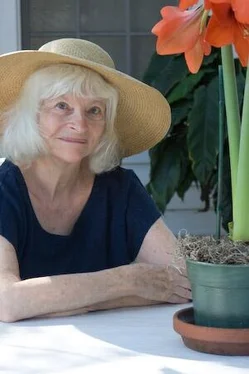He went back through the bedroom into the kitchen. The record was still playing.
“Hi.” Ceci turned. She was wearing a man’s old work-shirt, with the sleeves rolled up, open all the way down the front. Otherwise she was wearing nothing.
“Hungry? It’s ready.” She pulled the pan off the stove, slid eggs onto a plate, added sliced tomatoes, green pepper, and onion, wiped her hands on her shirt-tail, pushed her hair back, and sat down. “You can sit there.”
Paul walked round the kitchen table, past the kitchen chair full of Ceci, and sat. Déjeuner sur l’herbe, he thought. He might at least have left off his jacket and tie.
“This is great,” he said, referring to everything.
“Thanks.” Ceci smiled. “You’re sort of great yourself,” she added
“So are you.”
They ate.
“What’s so great about me?” Paul asked.
“I d’know. I guess what I like is, you’ve got a lot of go but you’re not hung up on anything. And I think you’re kind of happy with yourself, so you don’t have to put anyone down.”
They smiled at each other. Ceci put her hand out across the table; Paul took it. He continued to eat with his left hand.
“You really trust me, don’t you?” he asked. “The way you went to sleep in my arms like that. You trust me like that and you hardly know me. How come?”
“You have to trust people. That’s the way it is.” She shrugged. “Sure, they might shuck you; but if you don’t trust anybody you shuck yourself worse.”
This answer pleased Paul, but not completely; he would have liked it to include some testimonial to himself. Whom else had she trusted? He relaxed his hold on Ceci’s hand; she took it back, and began to butter toast.
He tried another subject. “I really like the way you paint. That big picture you’re working on now. That’s really interesting.”
“Which one?”
He described it.
“Aw, that’s finished. I finished it last month; it’s only still up there because I haven’t done anything big since. I only blow a picture sometimes; you know, when I really feel like it. Here.” Ceci stretched across the table to put a piece of toast on Paul’s plate, skimming the butter with her right breast.
“Thanks.”
She sat down again, but the breast did not make it back under her shirt; it remained outside, the full lower curve shiny with butter, the nipple pointed towards him.
“But what I dig most,” (he used her idiom rather self-consciously) “is the painting in the bedroom. On the ceiling. That’s great.”
Ceci put down her coffee cup. “I didn’t paint that,” she said. “My husband made it.”
“Oh.” Paul had forgotten about the husband. “It’s good, anyhow,” he said. “Is he a painter too?”
“He could be. He’s everything. Only he’s nothing. He’s a shit. Let’s not talk about him.” Ceci became visibly disturbed as she spoke. Unconsciously, she pulled her shirt together in front; the breast disappeared.
Paul made an effort, and began to talk about something else: Ceci’s painting. He told Ceci that painting was very important and that she was very important. Meanwhile he kept thinking about the husband. Who was he; where was he? She ought to paint more and take it more seriously, he said. Then maybe she could have a show.
“What for?” Ceci sat back. “So they can take my pictures away and put them in somebody’s store, and then in somebody’s house, like some rich square? Uh-uh.” She grinned, and put her elbows on the table. “I feel like keeping my pictures.”
Paul grinned back. A good moment. She was a beautiful, a really original girl. But he kept thinking about her husband.
“What’s his name?”
Ceci did not pretend to be puzzled. “Walter.” She put her cup onto her plate, beginning to clear the table.
“Walter O’Connor.”
“Christ, no. O’Connor’s my name. Walter Wong.”
“Wong?”
“Yes. He’s half Chinese.” Ceci was standing up now, gathering plates. She looked at Paul hard, to see how he took this. He did not know how he took it himself, but he felt uneasy. What was he supposed to say?—Some of my best friends are Chinese—?
“My wife’s called Katherine,” he volunteered, thinking he might at least reciprocate. “She’s really a nice girl, but she’s very unhappy in Los Angeles.” These remarks sounded stupid. “She misses the East.” Ceci, continuing to stare at him, gave no help. “And she’s sick, most of the time.”
“That’s tough. I’m sorry. What’s the matter with her?”
“Sinus trouble. She gets terrible headaches.”
“For Christ’s sake.” Ceci put a pile of plates down loudly in the sink. “Headaches! I thought you meant like she had cancer or something.” She wrung out a dish-rag. “So you could still be making it with her, only you don’t feel like it,” she said indistinctly, wiping the wooden table. Paul heard concern in her voice, and insecurity. She really cared. Maybe it was this that made him lie by implication.
“She doesn’t feel like it either.”
“Only you still live with her. Like in the same house.”
“Well, yes. Only—” Paul paused.
His marriage had, up to now, kept him safe through the stormiest encounters: it was like an invisible aluminum armor against which the most passionate blows, either from within or from without, would always beat in vain. He had never deceived anyone—he always made it plain at the start that he was deeply committed to his marriage. As it happened, no woman had ever turned him down for this reason. Some of them broke out at once in a gale of sobs and protestations, subsiding eventually to sad looks and sighs. Others replied that that was just fine with them: they, too, did not wish to “get involved”—but sooner or later there would be sulks and arguments, an odor as of something smoldering, rising sometimes to a sudden blaze in which fists beat on cushions and objects of apparel or household use were thrown. Paul was always strongly moved when he saw women in tears or in a rage. It roused both his affections and his passions; his warm heart leapt to meet theirs—but it, too, fell back, checked by the invisible armor.
He should have explained himself to Ceci already, but this time everything had happened too fast. Still, the sooner the better; he told her now. He said that he loved his wife and that she loved him, in her own way; he announced—what he knew to be true—that she needed him very much and that he could not leave her.
Ceci made no comment whatsoever. She shook detergent over the dishes in the sink, and turned the tap. A thin twist of brownish water came out of the tap. “Damn it.” She turned both taps back and forth. “Shit.”
“What’s the matter?”
“The water pressure’s gone off again. It’s always doing that; sometimes we have practically no water in the building for days. I might as well leave the dishes and get dressed.”
Paul followed her into the bedroom. Why hadn’t he left it alone? “You didn’t say anything,” he finally burst out.
“Say anything?”
“About what I told you just now.”
“What’s there to say? I heard you.” Ceci pulled up the sheet and blanket, her back to him. Then, as if relenting, she turned to Paul and smiled, a half smile. He felt immeasurably relieved, reprieved.
Ceci took off her shirt and put on a black cotton jersey and a striped skirt. “Don’t you ever wear any underwear?” he asked.
“Don’t have any.” Ceci smiled. “It saves money.”
Paul laughed. But it also disturbed him. He thought of Ceci walking around Los Angeles, her secret parts exposed to the air and smog beneath her loose skirt. “Don’t you get cold in the winter?”
Читать дальше












